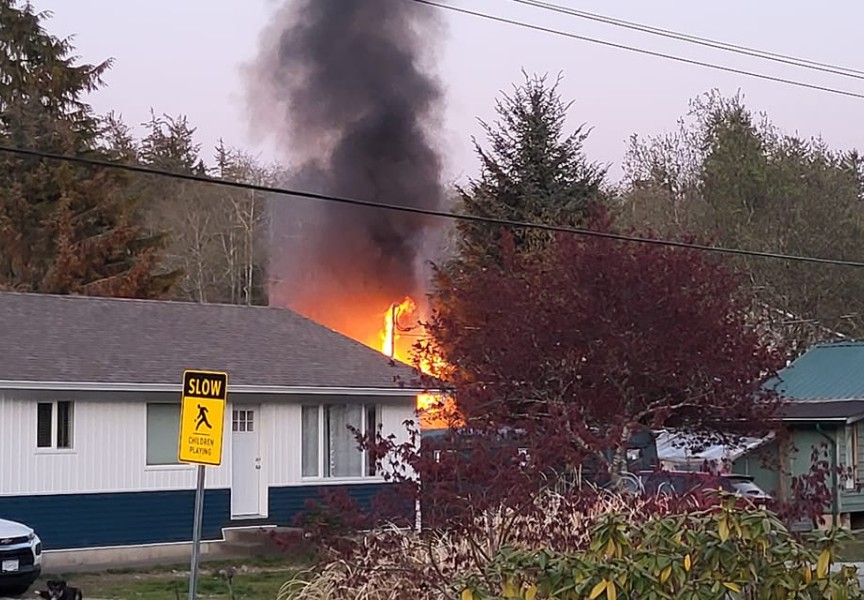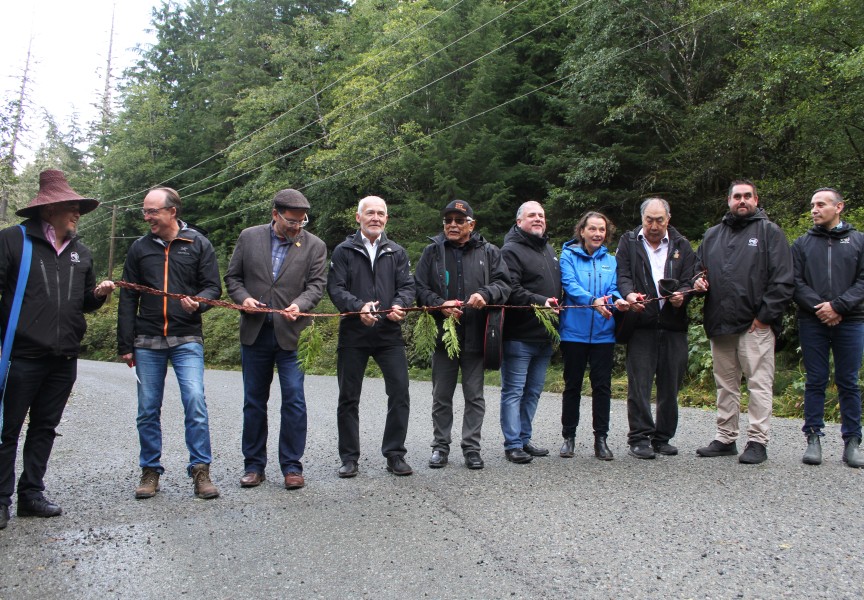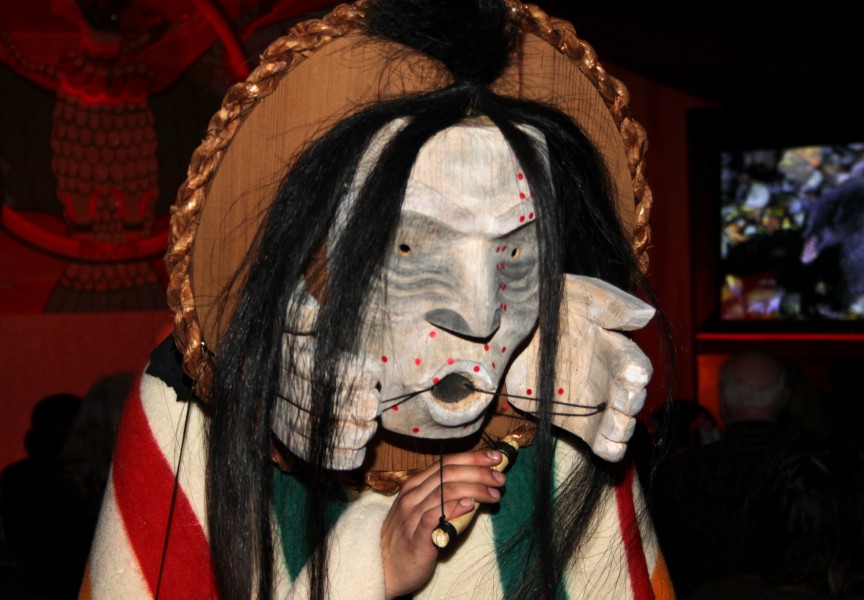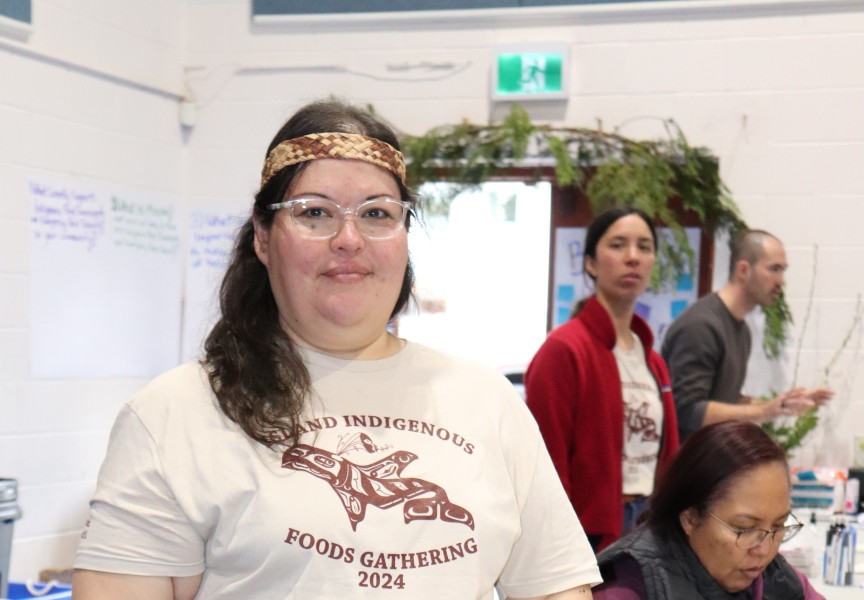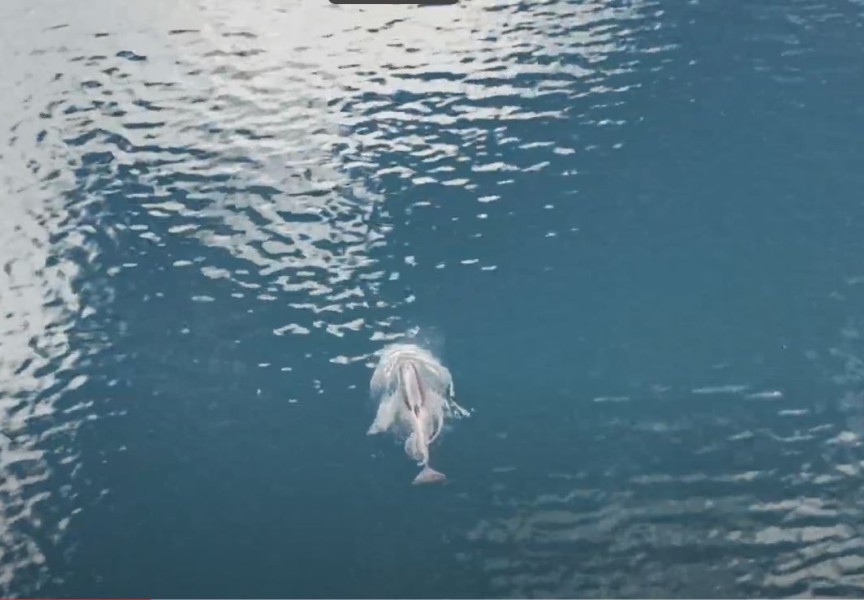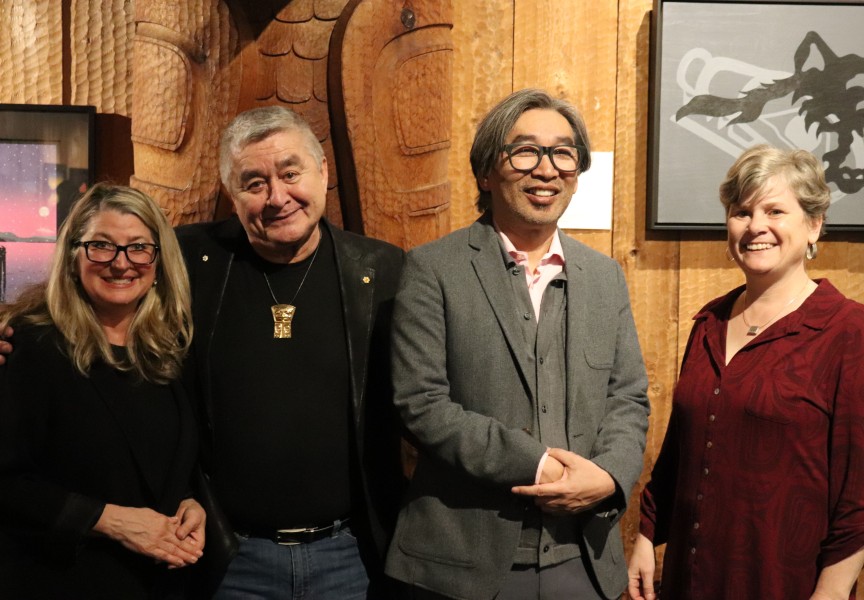Update: Sept. 18, 2015 at 3:02 p.m.
The Ahousaht Ha’wiih (hereditary chiefs) have now met the final demand made by a small group of protestors occupying a salmon farm floating system within the Ahousaht territory.
“After much discussion and communications with Ahousaht people and Cermaq Canada, the Ha’wiih and Chief & Council support the indefinite removal of Yaakswiis as a potential replacement fish farm site,” reads a letter to Ahousaht members.
A delegation of elected Ahousaht leaders set out on the morning of Sept. 17 to meet the protestors. The leaders had with them the letter from the Ha’wiih promising improved communications and requesting again that the protesters stand down. Ahousaht elected Chief Greg Louie, along with two councillors, delivered the letter.
Grant Warkentin, communications officer at Cermaq Canada, said the company made a commitment to Ahousaht leadership to move their cage system away from Yaakswiis.
“We have committed to discuss this site with Ahousaht Ha’wiih and chief and council,” said Warkentin.
The Ha’wiih acknowledged that more work needed to be done in terms of engaging the community in Maaqtusiis Hahoulthee Stewardship Society’s (MHSS) business decisions. They requested that the blockade be taken down and promised to move forward in a respectful way with improved communications.
“It’s what we asked for; they heard us and they met our three conditions,” said Tom Paul, an Ahousaht member and spokesman for the protestors.
The conditions set by protesters to remove their blockade were:
1. Provide a copy of the final signed protocol agreement between Ahousaht and Cermaq Canada
2. Provide a copy of the Maaqtusiis Hahoulthee Stewardship Society’s (MHSS) audited financial statements
3. Remove Yaakswiis as a potential replacement fish farm site indefinitely
The community met Sept. 14 and two of the conditions were immediately met, but the third required follow-up meetings with Cermaq Canada, who were not invited to the Sept. 14 meeting.
Paul said that he, in no way, meant to put down Ahousaht’s government, but he was happy that “they heard us loud and clear.”
“I’m interested in consultation, transparency, the environment and fair process,” said Paul. He said he looks forward to meetings with leadership to take a closer look at the fish farm protocol agreement.
“I fought a fight and won,” said protester Lennie John, who said he was holding back his happy tears. “All I ever wanted from day one was to protect our territory for me, my children and grandchildren.”
John led the protest and started an online petition seeking to prevent the installation of the Yaakswiis salmon farm because he believed it would be too close to a salmon-bearing river and clam beaches.
John said he is mostly happy with the chief’s letter, but asked for wording changes that would make it clear that Yaakswiis is protected forever from salmon farm sites.
“I will clear the blockade when I have that letter in hand,” John promised.
Ahousaht Tyee Ha’wilth Maquinna, Lewis George, could not attend community meetings due to illness so his son attended in his place. In a phone interview with Ha-Shilth-Sa Maquinna said he is all for protesting because it shows that you have something to believe in.
He said the work he and the other Ha’wiih are doing through MHSS is moving forward with exciting new possible business opportunities, but there has been a lapse in communicating that to membership.
“We have been trying to meet with the people for a long time and have a presentation from MHSS prepared for the Ahousaht AGM, but that was cancelled due to losses in the community,” Maquinna said. He hopes a new AGM will be scheduled for late October so that he can attend if his health improves.
Maquinna pointed out that money Ahousaht receives through its protocol agreement with Cermaq is reinvested into economic development. It is also used to support important community activities. If a solution is not found that would get the new farm site up and running, then Ahousaht could be impacted financially.
“There are (possible) effects that our people need to know about, like every year we send $100,000 to the band fisheries department for home use fish; that money comes from the Cermaq fund,” said Maquinna. He said other activities supported by the funding from Cermaq include youth activities, elder’s gatherings and canoe journeys.
The leadership of Ahousaht, along with some of the members, will take part in a technical committee to work on these issues.
Maquinna said when his health returns he will go on the road with Ahousaht leadership to share band information.
“We will take it on the road and make decisions based on consensus; and if members are against anything we are doing, just say so; come to us and tell us,” he said.
While Tom Paul and Lennie John are satisfied by the actions of the Ha’wiih, there are a couple of hardline protestors unwilling to stand down.
“The remaining group will be small and not reflective of the majority Ahousaht perspective,” said Tyson Atleo, speaking on behalf of the Ha’wiih.“The Chiefs and Chief & Council remain firmly committed to respectful dialogue and progress with the Nation,” said Atleo.
Updated Sept. 16, 2015 1:42 p.m. with Fish Farm protester Tom Paul's comments.
A small group of fish farm protesters calling themselves Ahousaht Muuschim, and their supporters, accepted an invitation to meet with Ahousaht leadership and other band members at the Thunderbird Hall Sept. 14.
Tyee Ha’wilth Maquinna Lewis George extended the invitation after protesters blocked the installation of Cermaq’s salmon farm just north of Ahousaht at Yaakswiis.
Chief Councillor Greg Louie spoke to Ha-Shilth-Sa immediately following the meeting, which included employees of Cermaq who are Ahousaht members. He said the meeting was respectful and productive.
Fish farm protest leader and Ahousaht member Tom Paul agreed the meeting was good and well chaired by Louie, but he said “There is a lack of transparency and communication and I see this as a stepping stone to changing governance.”
Ahousaht leadership was able to meet two of the protesters’ three demands, providing copies of all protocol agreements made between Ahousaht and the salmon farm company, and information on how much money Ahousaht received from the salmon farms, where that money is going and where it was spent.
Paul said his stand against Ahousaht leadership is even stronger now that he’s seen the protocol agreement between Cermaq Canada and Ahousaht. He says he will stand up to Ahousaht leadership and challenge them on clauses relating to communication and consultation with Ahousaht membership.
Paul said his group will rip apart the agreement because of the lack of communication. But he assures Ahousaht people working for Cermaq that their jobs are safe.
“We want a moratorium on salmon farms, meaning no more new farm sites, so their jobs are protected,” said Paul.
The third demand from protesters was the written assurance from the Ha’wiih, chief and council and Cermaq that the Yaakswiis site is permanently off the table. They said if these three demands were met, they would stand down.
“They want the Yaakswiis system removed (but it’s still there) and so they’re staying,” Louie said of the protesters’ intention to continue the blockade of the fish farm site.
The blockade began Sept. 9 after Cermaq Canada sent contractors out in a barge to work on the newly assembled floating pens at Yaakswiis. A group of four or five protestors refused the workers access to the pens.
The new Yaakswiis salmon farm is a replacement for the Dixon Bay farm, which wasn’t ideally suited because of weaker tidal currents. It would have been the second farm installed in that area, said Paul.
This is not the first time Paul has protested against salmon farms in Ahousaht. He helped lead a highly-publicized attempt in 2002 to close down a salmon farm in the territory. Back then, the fight was against Cermaq’s predecessor Pacific National Aquaculture.
The showdown was settled after both parties agreed to meet in Ahousaht to discuss their issues. In the end they reached an agreement that mapped out how Ahousaht and PNA could co-exist in the Ahousaht hahoulthee, and Paul got a job as first nation liaison with the company.
He said back then there were only 10 Ahousahts working for the company and he says he began working to increase that number. “I fought for jobs and benefits for our people; it went from 10 jobs to $3.5 million a year income to Ahousaht in jobs and contracts – I did that,” said Paul.
Paul said he had hoped that Ahousaht could find a compromise with industry and change the way fish farms operate. “But I couldn’t get people to come to meetings.” He said growing frustration with his job and changes within the company caused him to leave.
In 2010 Paul moved back to Ahousaht and began working for the band as Natural Resource manager. The job allowed him to be involved in forestry, fishing and all other natural resource committees.
He was also involved in Ahousaht’s fish farm committee and was aware that some existing salmon farms in Ahousaht territory needed to be relocated because the currents were not strong enough to properly flush the farm sites.
According to an Aug. 11 message released by Maaqtusiis Hahoulthee Stewardship Society (MHSS) and Ahousaht Business Corporation, the Ha’wiih sought to assure members that they had been studying the tenure applications at length and determined that their best option was to move the Dixon Pass tenure to the better-suited site at Yaakswiis.
Ahousaht Ha’wiih asked Cermaq Canada to move the Dixon Bay site and it took more than two years to get the necessary government approvals for Yaakswiis. Another site application Cermaq sought was refused by government agencies.
Paul ceased to be employed as Natural Resources manager in 2012, just as he began to build his new house, he told Ha-Shilth-Sa. It was then that the MHSS was formed and the Ahousaht hereditary chiefs took over Ahousaht’s economic development and natural resource management. According to Paul, he lost his management job without notice.
Since that time, Paul says, he has been trying to get information from MHSS.
Paul says the protestors are building support for their cause, but adds that it is important for Ahousahts to work together.
“We really need to pull together in this because this is something that big corporations do around the world,” said Paul. “They come into communities, then they divide and conquer.”
Paul says he is a proud and passionate Ahousaht man and says he sees this protest as his springboard to be heard.
“The Ha’wiih are doing their best to work with the protestors,” said Tyson Atleo, speaking on behalf of A-in-chut Shawn Atleo. “We are committed to work together to find solutions.”
Update Sept. 15, 2015 1:13 p.m.
A small group of fish farm protesters calling themselves Ahousaht Muuschim and supporters accepted an invitation to meet with Ahousaht leadership and other band members at the Thunderbird Hall Sept. 14.
Tyee Ha’wilth (head chief) Lewis Maquinna George extended the invitation after protesters blocked the installation of Cermaq’s salmon farm just north of Ahousaht.
Chief Councillor Greg Louie spoke to Ha-Shilth-Sa immediately following the meeting, which included employees of Cermaq who are Ahousaht members.
He said it was respectful and productive. Ahousaht leadership, he said, was able to meet two of the protesters' three demands, providing copies of all protocol agreements made between Ahousaht and the salmon farm company, and information on how much money Ahousaht received from the salmon farms and where that money is going and where it was spent.
Protesters also wanted written assurance from the Ha’wiih, chief and council and Cermaq that the Yaakswiis site is permanently off the table. They said if the three demands were met, they would stand down.
“They want the Yaakswiis system removed (but it’s still there) and so they’re staying,” Louie said of the protesters’ intentions to continue their blockade of the fish farm site.
“The Ha’wiih are doing their best to work with the protestors,” said Tyson Atleo, speaking on behalf of his father A-in-chut Shawn Atleo. “We are committed to work together to find solutions,” he continued.
He promised there would be more meetings and that the Ahousaht Ha’wiih would issue another letter in the coming days.
The blockade began Sept. 9 after Cermaq Canada sent contractors out in a barge to work on the newly assembled floating pens at Yaakswiis. A group of four or five protestors refused the workers access to the pens.
The new Yaakswiis salmon farm is a replacement for the Dixon Bay farm, which wasn’t ideally suited because of weaker tidal currents. Ahousaht Ha’wiih asked Cermaq Canada to move the Dixon Bay site and it took more than two years to get the necessary government approvals for Yaakswiis. Another site application Cermaq applied for was refused by government agencies.
In the beginning, the protesters said they were opposed to the location of the new Yaakswiis farm site, saying it was too close to a salmon-bearing river and clam beaches. They said they were not consulted by their leadership about the new site and they do not approve of it.
In a letter to Ahousaht members dated Sept. 10, 2015, the Ahousaht Ha’wiih (Hereditary Chiefs) committed to meeting with the people the following Monday in an effort to come to a resolution.
The protestors responded with a letter of their own reiterating their position that there was no prior informed consent or consensus ‘amongst the whole of Ahousaht membership’ in terms of the Yaakswiis farm.
Ha-Shilth-Sa has placed numerous calls to the protesters’ spokespeople, but we have received no response. We will update this story when we have heard from them.
Original Story:
Environmental activists and a small group of Ahousaht members set up a blockade at the site of a new salmon farm pen that is being installed by Cermaq Canada in Ahousaht territory.
The net pens were newly-assembled and were to be towed to their government-approved site called Yaakswiis, just north of Ahousaht on Flores Island.
On Sept. 9, contractors hired by Cermaq to tow the net pens arrived at the site by barge. They were met by a handful of Ahousaht protesters, who prevented the contractors from undertaking their work.
The workers returned to Tofino, and Cermaq sent out an employee to monitor the site while four protestors hunkered down in their boat overnight.
On Sept. 10, Ahousaht Ha’wiih issued a statement to their people voicing their concern about the safety of all people attending the farm float at Yaakswiis. They called for calm and for people to be mindful of safety and respectful of property.
They committed to meeting with the people in the coming days.
“The Ha’wiih and leadership commit to engaging Ahousaht members in resolution based dialogue to be conducted in a calm, safe and respectful forum on Monday, Sept. 14,” said the statement.
“The Leadership respectfully request that those Ahousaht members involved in the active protest stand down to ensure the safety of all and to engage in dialogue,” the statement continued. It was signed by Ahousaht Tyee Ha’wilth Maquinna on behalf of Ahousaht Ha’wiih.
Ahousaht First Nation has a working relationship with Cermaq Canada, bolstered by a mutually-beneficial protocol agreement dating back to 2002. The agreement allowed the parties to work together to establish a sustainable finfish aquaculture business. Ahousaht would receive job opportunities for its members, economic benefits and the assurance that the parties would share information in order to foster an atmosphere of trust and respect while Cermaq would be allowed to continue to operate in Ahousaht hahoulthee.
The protocol agreement has been renewed over the years, most recently in January 2015.
Ahousaht Ha’wiih (hereditary leaders) were aware that some members had concerns about the salmon farm site reassignment. According to an Aug. 11 message released by Maaqtusiis Hahoulthee Stewardship Society (MHSS) and Ahousaht Business Corporation, the Ha’wiih sought to assure members that they had been studying the tenure applications at length and determined that their best option was to move the Dixon Pass tenure to the better-suited site at Yaakswiis. The Ha’wiih consider Dixon Pass one of their pristine areas and requested that Cermaq move the net pen.
The Ha’wiih said they were keeping to their commitment to the community to remove the historically-poorly sited Dixon to a preferred, well-flushed, more suitable site, like Yaakswiis.
The planned move has been in the works for at least two years and was approved by both the Ha’wiih and by the previous elected Ahousaht chief and council.
Laurie Jensen of Cermaq Canada says her company works closely with Ahousaht and are respectful of their people and their processes. She said the Yaakswiis site was selected by Ahousaht back in 2010, but the move couldn’t be made until recently because it just takes that long to get all the government approvals in place.
“We really do value the relationship we have with Ahousaht and we are concerned about the safety of the people going out there,” Jensen said. There are safety issues that the work crews wanted to address on Sept. 9. The cages are floating, unanchored, in the water and are dangerous for anyone to be standing on.
“For us, it’s safety first, not only for the protestors but also for all Ahousaht people and our employees,” she said. The company hopes to be able to secure the cages to make them safe and to remove any navigation hazards.
Ahousaht member Lennie John is involved with the protest and is on record saying that Ahousaht members were not informed of the Yaakswiis site. Ahousaht member Thomas Paul is listed as a contact person for the protestors but could not be reached at press time.
The protocol agreement between Ahousaht and Cermaq followed a highly-publicized attempt in 2002 to close down a salmon farm in the territory after government red tape caused a lapse in operating permits for company.
Back then, the agreement was signed by Cermaq’s predecessor Pacific National Aquaculture or PNA.
The showdown was settled after both parties agreed to meet in Ahousaht to discuss their issues. In the end they reached an agreement that mapped out how Ahousaht and PNA could co-exist in the Ahousaht hahoulthee.
In its Aug. 11 statement to its members, MHSS announced the intention to begin a business feasibility study for an on-shore aquaculture operation that could be sited at the private property held by MHSS at Maatsquiaht.

